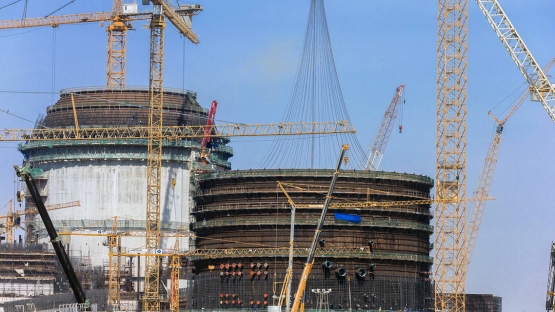Interview with Ambassador Hamad Al Kaabi, Resident Representative of the United Arab Emirates to the IAEA.
The UAE decided to embark on nuclear power in 2008, becoming in 2012 the first 'newcomer' country in 27 years to start constructing its first reactor. Three of the four reactors planned are already under construction. How did you do it so fast? What are the experiences and challenges faced so far?
Upon taking the decision to embark on a national nuclear power programme, the Government took into consideration all elements required for developing a successful programme. We began by establishing a detailed policy framework that would guide the progress of the programme. The UAE based its approach on international best practices, understood early in the process the required nuclear infrastructure and identified the measures for meeting national targets in time. Strong government commitment, establishing the legal framework and a competent nuclear regulator, as well as adopting an innovative procurement approach all allowed the UAE to advance quickly. Also, strong international cooperation, well defined roles and responsibilities for various national stakeholders, and making the required resources available helped the UAE not only to have a quick start but also sustain the progress.
Building a sustainable national capacity is a challenge for the global nuclear sector and naturally also for the UAE. We have taken aggressive steps in developing the required human resources through an array of programmes, including scholarships, on-the-job trainings, and introducing nuclear education at undergraduate, Masters and PhD levels. These will produce an advanced nuclear cadre to support long-term sustainability objectives.
How is the UAE cooperating with experienced nuclear countries?
Transfer of technology, nuclear material and knowledge can only be done through a robust international nuclear cooperation framework. The UAE has concluded nine bilateral nuclear cooperation agreements with responsible and experienced nuclear countries, mainly suppliers and those with good track record in nuclear power development and management. Both government-to-government agreements and industry-to-industry arrangements, early on in the programme, have proven key to the UAE's programme in several aspects, such as safety and security, transfer of technology and human resource development.
What is the involvement of the national industry in the nuclear power project?
Given the opportunities the nuclear programme offers, the national industry response has been quite substantial and its involvement in the project has increased by time.
Along with the UAE's prime contract with its Korean partners, many subcontracts have been concluded with local contractors, particularly in the areas of construction, site preparation and infrastructure development. Emirates Steel, for example, has been a main supplier in the Barakah NPP construction, having so far delivered around 100,000 tons of steel expecting to do more.
The power plant requires particularly robust and high quality materials to meet the nuclear safety and security standards. Hence, the nuclear programme has also enabled some local industries to upgrade their quality standards to meet such "nuclear grade" standards
The UAE has been working closely with the IAEA during the initial phases of the project. Now that the programme is quite advanced, what kind of support does the UAE expect from the IAEA?
The close partnership between the UAE and the IAEA dates back to preliminary consultations before we decided to develop a nuclear programme. From the outset, all steps taken have been in line with the IAEA's Milestones Approach, according to which we are now in the last phase. Additionally, the UAE has concluded and implemented all relevant international agreements under the auspices of the Agency covering all areas of nuclear safety, security, non-proliferation and nuclear liability.
We have been very active in the IAEA's Technical Cooperation (TC) programme, through which we receive important capacity building support. The number of UAE participants in IAEA activities and events has significantly increased to over 600 in 2013. The IAEA has been supporting us in developing the nuclear regulator, its legal framework and training. An Integrated Work Plan with the Agency enabled us to establish a holistic approach of IAEA assistance towards the UAE programme. We have an on-going, agreed programme of IAEA support up to the projected operational date of the NPP.
We are now getting closer to "graduating" from the "nuclear newcomers" category. But we will continue to seek IAEA assistance even when we move into the advanced stages of commissioning and operation. We will continue to be interested in IAEA peer reviews and technical support to ensure safe operation. While support areas may change, IAEA assistance will continue to be valuable.
The UAE will also continue to contribute to the work of the Agency by providing feedback and sharing its experience in implementing the IAEA guidance. This has proven to be of high interest to other member states who are interested in embarking on a new nuclear programme.




